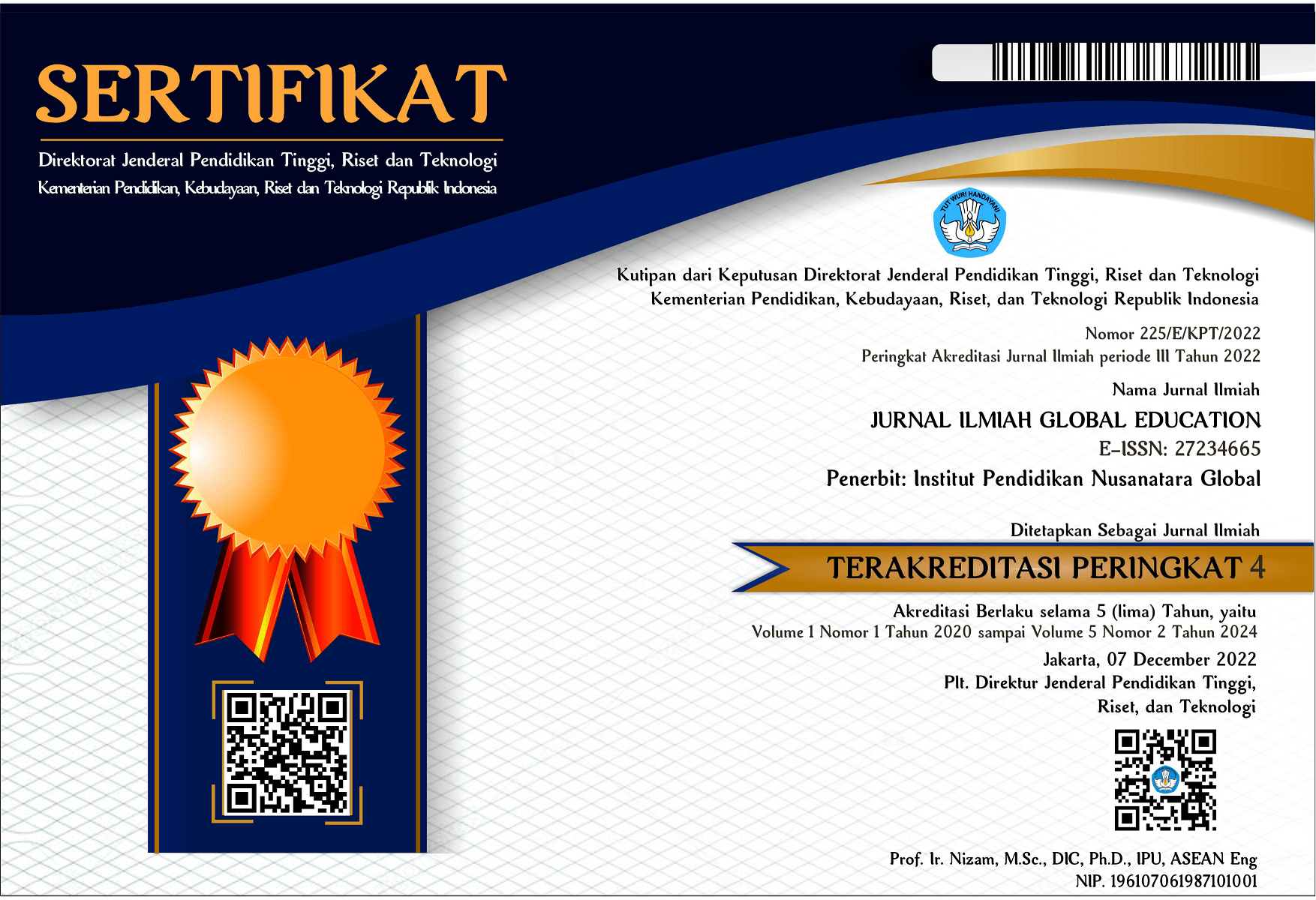The Importance of Village Apparatus Performance Improvement for Quality Public Services
DOI:
https://doi.org/10.55681/jige.v5i2.2760Keywords:
Performance, Village Apparatus, Quality Public ServicesAbstract
Village apparatus are public service staff who have duties and responsibilities for services to the community and assist the village head in carrying out his duties to provide services to the community expectations. Therefore, village apparatus is required to have commitment, ability, skills, and feelings of sincere concern and require a high sense of empathy in carrying out their duties to serve the community. The hope is that the community will feel comfortable and satisfied with receiving services from village staff in resolving all administrative problems. However, this is not the case with what happens in the field. There are still many complaints from the public regarding the services provided by the apparatus at the village office. This research is aimed at answering the question of how public services are implemented in village offices in 5 provinces in Indonesia, namely West Java, Data collection was carried out using documentation and semi-structured interviews with community members and staff at the village office. The results of the research show that the indicators of service quality have not been implemented by staff in village offices in Indonesia. Apart from that, the quality of service of staff must be improved through training programs.
Downloads
References
Aria, M., & Atik, I., L. (2018). Tata Kelola dan Administrasi Untuk Meningkatkan Kualitas Pelayanan Administrasi PT. BAM. Jurnal Institusi Politeknik Ganesha Medan, 1(1), 14-24.
Arianto, N. (2018). Pengaruh Kualitas Pelayanan Terhadap Kepuasan Dan Loyalitas Pengunjung Dalam Menggunakan Jasa Hotel Rizen Kedaton Bogor. Jurnal Pemasaran Kompetitif, 1(2), 123-134. https://doi.org/10.32493/jpkpk.v1i2.856
Creswell, J.W. (1998). Qualitative Inquiry and Research Design: Choosing among. Five Tradition. London: Sage Publications.
David, Williams. (1995). Lexy Moleong. New York: McGrw-Hill Irwin.
Eko. Wayu, Yudiatmaja. (2009). Total Quality Service: Paradigma Baru Peningkatan Kualitas Pelayanan Publik di Era Otonomi Daerah, Visi Publik Jurnal Ilmu Administrasi Publik Volume 6 Nomor 2 Edisi Oktober 2009- Maret 2010, Universitas Jenderal Soedirman
Fajarwati, N. (2019). Pengembangan Kapasitas Aparatur Pemerintah Desa dalam Rangka Mewujudkan Good Governance. Jurnal Wacana Kinerja, 22(2), 219-234. http://dx.doi.org/10.31845/jwk.v22i1.165
Fandy Tjiptono dan Gregorius Chandra. (2016). Service, Quality & Satisfaction. Edisi 4, ANDI, Yogyakarta. Hlm. 141.
Hasbiansyah, O. (2005). Pendekatan Fenomenologi: Pengantar Praktik. Penelitian dalam Ilmu Sosial dan Komunikasi. MediaTor, 9(1), 163–180. https://doi.org/10.29313/mediator.v9i1.1146
Iskandar, A. Halim. (2020). SDGs Desa Percepatan Pencapaian Tujuan Nasional Berkelanjutan. Jakarta: Yayasan Pustaka Obor Indonesia.
Kasmir (2015). Manajemen Sumber Daya Manusia. Jakarta: PT Raja Grafindo Persada.
Kasmir. (2017). Customer Service Excellent: Teori dan Praktik. PT Raja. Grafindo Persada: Jakarta. Hlm 47.
Keputusan Menteri Pemberdayaan Aparatur Negara Nomor 25 Tahun 2004 tentang Pedoman Penyusunan Indeks Kepuasan Masyarakat Unit Pelayanan Instansi Pemerintah
Kotler, Philip and Kevin Lane Keller, (2016). Marketing Management. 15th Edition New Jersey: Pearson Prentice Hall, Inc. Hlm.143.
Mangkunegara, A.A. Anwar Prabu. (2002). Manajemen Sumber Daya Manusia. Perusahaan. Bandung: PT. Remaja Rosdakarya.
Mangkunegara, A.A. Anwar Prabu. (2010). Evaluasi Kinerja SDM. Bandung: PT.Refika Aditama.
Moleong, Lexy J. (2007). Metodologi Penelitian Kualitatif. Bandung: Remaja Rosdakarya.
Moustakas. (1994). Phenomenological Research Methods. London: SAGE Pub. Hlm 119-153.
Mukarom, Z., Laksana, M. W. (2015). Manajemen Pelayanan Publik. Bandung: CV. Pustaka Setia.
Mukarom, Z., Laksana, M. W. (2016). Membangun Kinerja Pelayanan Publik Menuju Clean Government and Good Governance. Bandung: Pustaka Setia. Hlm 41.
Robbins, P. Stephen. (2006). Perilaku Organisasi. Edisi Sepuluh. Diterjemahkan oleh: Drs. Benyamin Molan. Jakarta: Erlangga.
Soeprihanto, John. (1996). Penilaian Kinerja dan Pengembangan Karyawan. Yogyakarta: BPFE UGM. Hlm 6.
Sugiyono. (2005). Memahami Penelitian Kualitatif. Bandung: CV. Alfabeta.
Sugiyono. (2016). Metode Penelitian Kuantitatif, Kualitatif dan R&D. Bandung: PT Alfabeta.
Sugiyono. (2018). Metode Penelitian Kuantitatif, Kualitatif, dan R&D. Bandung: Alfabeta. Hlm 476.
Sutrisno, Hadi. (2009). Metodologi Penelitian. Yogyakarta: Andi Ofset.Hlm. 167.
Undang-Undang Desa Nomor 6 Tahun 2014 pasal 1 ayat 2 tentang Pemerintahan Desa
World Health Organization (WHO). (2022). Mental Health. WHO International News Room. June 2022
Wuri, R. R., Kaunang, M., & Pioh, N. (2017). KINERJA APARATUR PEMERINTAH DESA DALAM MENINGKATKAN PELAYANAN PUBLIK (Studi di Desa Sinsingon Kecamatan Passi Timur Kabupaten Bolaang Mongondow). JURNAL EKSEKUTIF, 1(1). Retrieved from https://ejournal.unsrat.ac.id/v3/index.php/jurnaleksekutif/article/view/16192
Downloads
Published
How to Cite
Issue
Section
License
Copyright (c) 2024 Mira Permata Sari, Rahadi Pratomo Singgih

This work is licensed under a Creative Commons Attribution-ShareAlike 4.0 International License.













